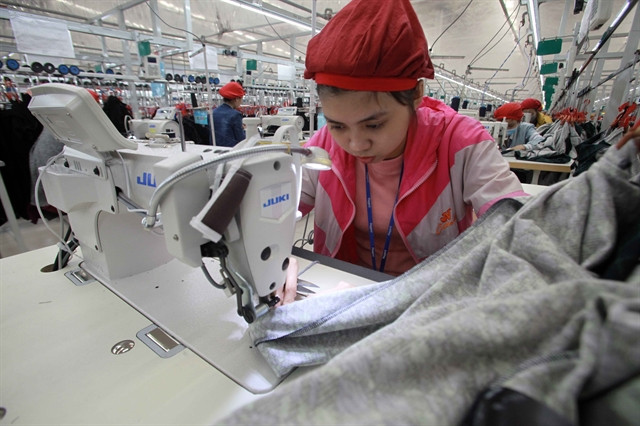 A worker at Tinh Loi Textile Company in Nam Sach Industrial Zone in the northern province of Hai Duong (Source: VNA)
A worker at Tinh Loi Textile Company in Nam Sach Industrial Zone in the northern province of Hai Duong (Source: VNA)HCM City (VNS/VNA) - The negotiating skills of executive boards oftrade unions need to be strengthened, Tran Thi Thanh Ha, deputy head of the VietnamGeneral Confederation of Labour's labour relations department, said.
“There are many reasons for this, including workers on trade unions’ executiveboards who lack deep understanding about payroll and other salary matters,” Ha explained.
Nearly 90 percent of strikes are caused by salary disputes, with 80 percent ofthem arising from employers' violations of legal regulations and collectivelabour agreements about salaries and bonuses, she said.
To ensure the best employee benefits, the role of trade unions should beenhanced to strengthen dialogue and negotiations about salaries, she added.
Beginning in 2021, the Government will not directly intervene in the payrollsof enterprises, and employers and trade unions will negotiate the salaries.
Vu Minh Tien, head of the Institute for Workers and Trade Unions, said the taskof trade unions was difficult but necessary to ensure employee benefits.
At a forum on the garment and electronics sector in Ho Chi Minh City and Dong Naiand Binh Duong provinces held on July 10, members of trade union executiveboards said they could not negotiate salaries because the salaries were higherthan the minimum monthly wages regulated by the government.
The salaries are also higher than the average wages at many other companies,and it is easier to negotiate allowances than to raise wages, they said.
Many of the unions' executive board members, who acknowledged they lackednegotiation skills, said they needed to know more about legal regulations andemployers’ production situations.
Nguyen Vinh Quang, head of the labour relations department at the Vietnam GeneralFederation of Labour, said the payroll should ensure benefits for employers andemployees.
The fields of garments and electronics have the highest number of labourproblems, Ha said, adding that collecting opinions is the first step increating strategies and plans to train members of trade union executive boardsin negotiation skills.
The Vietnam General Confederation of Labour will pilot the training of tradeunion executive board members in eight provinces and cities within the next twoyears.
During a talk on increasing the basic wage for labourers in Hanoi on July 10,deputy director of the Department of Labor Relations Le Dinh Quang from the VietnamGeneral Confederation of Labor (VGCL) said the VGCL stands by its earlierproposal to increase wages by between 7 and 8 percent starting in 2020 to meetthe basic demands of workers.
The increase of 5.3 percent proposed by the National Wage Council would not beenough to meet workers' needs, Quang said.
According to a recent survey conducted by Institute of Workers and Trade, thewages of textile labourers are not high enough for them to afford livingexpenses.
About 65 percent of the workers in the survey have to work extra timeregularly. About 53 percent cannot afford the cost of healthcare.
Nguyen Dinh Thang, vice president of the trade union of industrial zones in Hanoisaid the city has nine industrial zones but only one has a kindergarten forworkers’ children. He said basic wages must increase by more than 9 percent tomeet workers’ needs.
Associate Professor Vu Quang Tho, former head of the Institute of Workers andTrade, said most of the workers in the textile sector want firms to pay them aliving wage without having to work overtime.-VNS/VNA


























